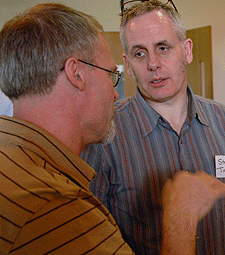The wisest thing some ministers can do for mission is "downsize the amount of effort that goes into the Sunday event,' Total Church author Steve Timmis told a packed Moore College lecture theatre yesterday.
The one day Total Church conference was attended by over 100 people, largely Sydney Anglican ministers and Moore College students.

Steve's advice came in response to a question from the Rev Chris Braga, rector of St Andrew's, Summer Hill, on whether it was possible to keep running an "attractional' Sunday service while at the same time developing the kind of mission-focused Christian community Steve advocates.
Steve argues that many ministers need to face one of the ironies of their role: "that their eye-ball to eye-ball, shoulder to shoulder contact with non-Christians is limited'.
"Even rarer is those of us in supported ministry actually hanging out with the dregs of society" When was the last time we were accused of being drunks, drug addicts and pimps because of the people we hanging out with" Jesus was."
In contrast, Steve says the "MO' of the Crowded House network "is scattering communities of light out into the city'.
"We want to scatter that light into the gutters, the crevasses, the backalleys" get it into where the pimps and prostitutes are" that's only going to happen when we have communities of light living in those communities."
Steve's advice to Chris and ministers running similar churches is to reflect on whether they are genuinely making time for "hanging out' with non-Christians.
"If you spend 2 hours making your powerpoint " cut back to 1 hour and use the other hour to have a coffee with non-Christians," he says. "Just start with simple, almost mechanical things like time management" so you are actually doing both."
Steve explains that the Sunday meetings at his church are "nothing special'.
"We are not trying to lower the level of what happens on Sunday but raise the profile of what happens during the week," he says.
"What is special is the mundane that is lived out with gospel intentionality" It's about choosing to watch a particular film for the sake of the gospel, or choosing to take a particular job because of the gospel"
Total church in practice
Steve Timmis also cited research that found that within a few short years of converting the average Christian has lost contact with all their non-Christian friends.
In the book Total Church, Steve and colleague Tim Chester tell their story of the growing Crowded House network of churches that began in the working class communities of Sheffield in northern England.
The model pioneered by the Crowded House churches helps new Christian keep these friends because, in Steve's words, they are no longer "just their friends but our friends'.
This is one key reason the Crowded House churches have been replicating themselves with regular new church plants.
But what does a "missional' Christian community look like in practice?
Steve explains that while his average week looks little different than most peoples, there is one significant difference: the activities most people typically do individually - go to the gym, go for a walk, watch football on TV - he will intentionally do with a group of friends as a church community activity open to mission opportunities.
"We even seek to get a job in the same place so we can share in the lives of others."
"We are not talking about the kinds of "friendships' we typically have in Western culture which are acquaintances of convenience, but gospel partnerships that are real relationships where we share our lives with each other."
Total church not emerging church
Contrary to what Sydneyanglicans.net has previously suggested, Steve Timmis says the Crowded House network was "never informed or shaped by the emerging church movement'.
He says it just a historical accident that that Crowded House began around the same time that the emerging church was coming to prominence.
Nor does Steve describe the network as a cell church movement.
"Our household churches have the rights and responsibilities of a churches," says Steve. "It's modified Presbyterianism."
The Crowded House has grown to become four separate networks of largely what Steve calls "household churches'.
There are two networks in Sheffield. Steve is involved in one of these. The leaders of the networked churches meet regularly, and each summer the Crowded House network runs a joint mission to Sheffield.
While most household congregations in the network have between 15 to 30 members, the congregation Steve leads has about 100 members and currently meets in a church building.
However, that is about to change.
"We are about to dissolve into five gospel communities. We will meet together once a week for teaching, but everything else - baptism, communion, discipline - will happen in community."





















